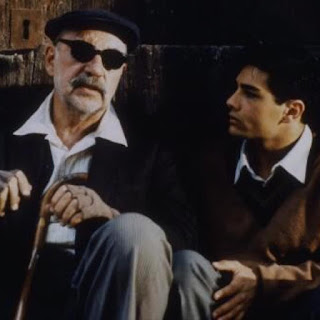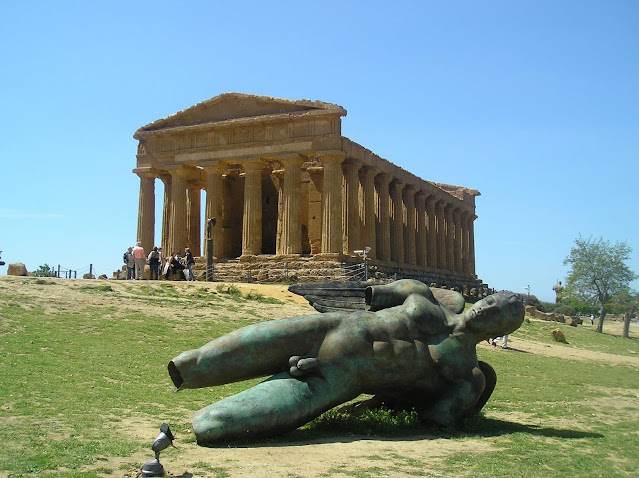Cinema Paradiso ... Movie Locations
With its beautiful natural scenery and breathtaking landscapes Sicily has set the scene for many Hollywood movies including The Godfather Trilogy, Oceans Twelve, Star Wars Revenge of the Sith and Aquaman and the British movie A Bigger Splash.
Many Italian movies have also been filmed here and one of the most successful is Cinema Paradiso.
Cinema Paradiso is a beautiful and moving Italian film with English subtitles written and directed by Giuseppe Tornatore, released in November 1988, which won the Academy Award for Best Foreign Language Film at the 62nd Academy Awards in 1989.
The film was shot in Giuseppe Tornatore's hometown of Bagheria as well as other locations on the island.
Told largely in flashback it is the story of a successful film director's childhood and teenage years and later the story of his return to his native Sicilian town. The film intertwines sentimentality with comedy and nostalgia. It explores issues of youth, coming of age and reflections in adulthood about the past.
In 1988 Rome famous film director Salvatore di Vita returns home late one evening where his current girlfriend tells him that his mother telephoned to say someone called Alfredo has died. Salvatore's character shies away from committed relationships and he has not been to his home town, the fictional Giancaldo in Sicily, for thirty years. As his girlfriend asks him who Alfredo is Salvatore flashes back to his childhood in Sicily.
A few years after World War II eight year old Salvatore, nicknamed Toto, is a mischievous and intelligent son of a war widow. Little Toto discovers a love for films and spends every free moment at his local movie house called Cinema Paradiso. He develops a friendship with the projectionist Alfredo who often lets him watch the movies from the projection booth.
During the showings the audience can be heard booing when there are missing sections causing the films to jump suddenly bypassing a critical romantic kiss or embrace. The local priest has ordered that these sections are censored and the deleted scenes lay piled up on the projection room floor.
Eventually Alfredo teaches Toto how to use the film projector. One evening Cinema Paradiso catches fire as Alfredo is projecting a film after hours onto the wall of a nearby house. Toto saves Alfredo's life but not before a reel of film explodes in his face leaving him permanently blind. The movie house is rebuilt by a local man who invests his football lottery winnings. Toto, still a child, is hired as the new projectionist as he is the only person who knows how to run the machines.
About a decade later, Salvatore (Toto), now in high school, is still operating the projector at the "Nuovo (New) Cinema Paradiso". His relationship with blind Alfredo is strengthened and Salvatore looks to him for fatherly advice with Alfredo usually quoting classic films in reply.
Salvatore has been experimenting with film using a home movie camera and he has captured on film Elena, a beautiful blue eyed daughter of a wealthy banker. Salvatore attempts on many occasions to woo Elena and finally wins her heart only to lose her after her father disapproves and has other plans for her.
As Elena and her family move away, heartbroken Salvatore leaves town for compulsory military service. His attempts to write to Elena are fruitless and his letters are returned as undeliverable. Upon his return from the military Alfredo urges Salvatore to leave Giancaldo permanently, telling him that the town is too small for him to ever follow his dreams, advising him that he must pursue his destiny wholeheartedly, never looking back and never to return even to visit and that he must never give in to nostalgia or even write or think about them. So Salvatore leaves the town to pursue his future in Rome as a filmmaker.
Salvatore obeys Alfedo's advice but decides to return home to attend his old friends funeral. Alfredo's widow tells him that the old man followed his successes with pride and that he left him something, an unlabeled film reel along with the old stool that Salvatore once stood on to operate the projector. Salvatore learns that the Cinema Paradiso is to be demolished to make way for a parking lot. At Alfredo's funeral he recognizes the faces of many of the people who attended the cinema over the years when he was the projectionist.
Salvatore returns to Rome. He watches Alfredo's reel and discovers it comprises all the romantic scenes that the priest had ordered Alfredo to cut from the movies. Alfredo has spliced the sequences together to form a single film of passionate kissing and embracing.
In a later extended three hour version of the film, the original version was deemed to long, on his return to Sicily Salvatore spots a beautiful young woman, a dead ringer for his teenage sweetheart, who turns out to be the daughter of Elena now married to a local politician. Salvatore and the grown up Elena enjoy a brief and intense reunion which resolves many questions left unanswered in the 1988 version of the film and which shows a darker side to Alfredo.
The fictional town of Giancarlo is based on the director's birthplace of Bagheria located east of Palermo. Although scenes were filmed in Bagheria, the iconic town square in the movie is Piazza Umberto I in the village of Palazzo Adriano about 30 minutes south of Palermo. It is close to the town of Corleone which gave its name to the infamous crime family in The Godfather, although director Francis Ford Coppola chose towns on the eastern coast of Sicily as filming locations for the movies.
The cinema in the movie was built in Via Nino Bixio overlooking the octagonal Baroque fountain which dates from 1608. The film set was dismantled after filming finished but you can still see the nearby house onto which Alfredo projects the movie which ended with the cinema catching fire and Alfredo being left blind. The two churches seen in the film face each other across the piazza.
It is outside Chiesa Maria SS Assunta that you see local women spreading tomato paste onto boards to dry in the hot Sicilian sun until they are disturbed by the local eccentric character who constantly pops up claiming ownership of the piazza shouting "piazza mia".
Later on in the film the teenage Toto sits on the church steps as he contemplates whether to follow Alfredo's advice and leave Giancaldo. Palazzo Adriano was originally an Albanian settlement and this church, built in 1532 but enlarged in 1770, is an Albanian Greek Orthodox cathedral. The more typical Sicilian style Chiesa Santa Maria del Lume is where the adult Toto attends Alfredo's funeral towards the end of the film. Most recently this year the fashion designers Dolce and Gabbana chose Palazzo Adriano as the destination to shoot their Spring Summer 2020 advertising campaign.
The war damaged streets through which Toto and his distraught mother walk after they receive confirmation of his father's death are the ruins of Poggioreale located about 20 miles west of Palazzo Adriano. Poggioreale was in fact destroyed not by the bombs of WWII but by a massive earthquake in 1968. This abandoned town is located a couple of miles north of a new town Nuovo Poggioreale.
In the northeast of Sicily towards the coastal town of Cefalù is the town of Castelbuono where the 14th century Castello dei Ventimiglia became Toto's school. Situated on a hill it was also known as Castello del Buon Aere meaning the 'Castle of Good Air' the origins of Castelbuono's name. For six centuries the town was home to the Ventimiglia family but it was bought buy the municipality in the 1920's and is now open to the public for tours.
The charming seaside town of Cefalù set the scene in the film for the seafront showing of Ulysses which is interrupted by a summer storm and where Salvatore is surprised by a kiss from Elena after being separated for many weeks. At the towns Porta Marina the seaside audience is seated on the ports old pier whilst the locals enjoy the film from boats in the bay.
Cefalù is a small fishing village now a resort thanks to its good sandy beaches and tempting restaurants and lies on a strip of land between the sea and a large promontory looming above. The village boasts a beautiful cathedral built by the Norman King Roger II which is decorated with exceptional mosaics. The medieval centre has warren like alleys that adds to its charm with the modern holiday resorts lying either side and it is one of my favourite places on the island and a must see destination.
If ever a movie came from the heart it would be Cinema Paradiso. It is one of my all time favourite films. It is many things, a touching story of friendship, young love, a wonderful portrayal of a Sicilian town, a tribute to cinema, amongst many things. The longer extended directors cut turns the film into one of the most moving and romantic love stories ever.
Whilst in Italian with subtitles it is easy to follow and if you are a fan of Inspector Montalbano you will be used to this and it is a perfect excuse to practice your Italian language skills.
The musical score and soundtrack compliments the film and was written by the celebrated composer Ennio Morricone. The score captures the gentle nature and nostalgic feel of the film masterfully with the "Love Theme" as a sentimental melody reoccurring throughout the film which adds to the romance.
The characters are fabulous with many of the cinema's audience reminding me of local people in my town with their delightful and funny Sicilian ways which is hard to explain unless you have experienced living in Sicily.
You cannot help but fall in love with the cheeky little Toto and laugh at the priest who sits alone in the cinema and watches the films before the locals are allowed to, ringing a little bell at each naughty scene when you know secretly he is probably enjoying them. The actor who played the part of young Toto was in fact from the town of Piazza Adriano. You also feel the heartbreak of Salvatore as Elena moves away and feel melancholy when the truth of their separation becomes apparent.
I would recommend any fans of Sicily to watch Cinema Paradiso, it is a real feel good movie and evokes a time when there was no TV's on the island and the only entertainment revolved around a local trip to the cinema. It is lovely to see the beautiful Sicilian scenery and soak up the life of a typical small Sicilian town.
This film will leave you with a warm fuzzy feeling.
Cinema Paradiso The Directors Cut
is available to order on Amazon.
If you enjoy this Blog post you might also enjoy these ones from my Blog archive ↓
"an afternoon in Cefalù"
"The Godfather … Movie Locations"
"The Montalbano Filming Location Tour"
"12 Sicilian Love Stories"
Photo Gallery
(Photo credits: Google Images)
Thank you for following me at
White Almond Sicily Blog
as seen in
The Ultimate Guide to Visiting Sicily
by Essential Italy
and featured in the novel
"My Lemon Grove Summer"
by Jo Thomas
I am also a contributor to
www.timesofsicily.com
For NEW Blog updates and all things Sicilan
Follow me on Social Media on
Facebook www.facebook.com/whitealmondprivatesicily/
Instagram www.instagram.com/whitealmondsicily/
Twitter www.twitter.com/sicilyconcierge/
For Travel Tips, Trip Advice and Recommendations
Email me on WhiteAlmondSicily@Gmail.Com
or fill out my Contact Request Form
www.timesofsicily.com
For NEW Blog updates and all things Sicilan
Follow me on Social Media on
Facebook www.facebook.com/whitealmondprivatesicily/
Instagram www.instagram.com/whitealmondsicily/
Twitter www.twitter.com/sicilyconcierge/
For Travel Tips, Trip Advice and Recommendations
Email me on WhiteAlmondSicily@Gmail.Com
or fill out my Contact Request Form
Love Sarah
🎞🎞🎞
🎞🎞🎞





















